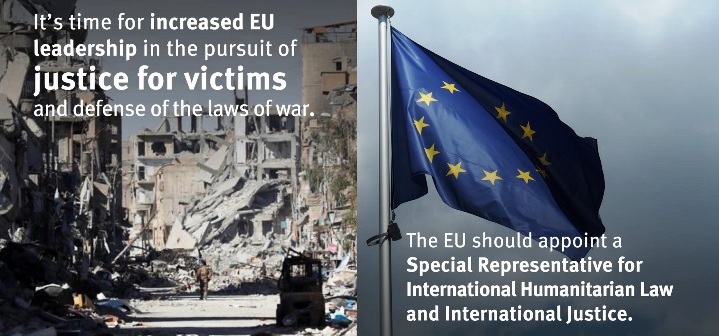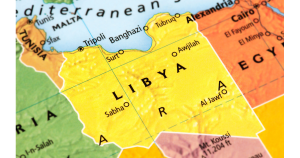14 September 2018
Download the joint letter (pdf)
Federica Mogherini
High Representative of the European Union for Foreign Affairs and Security
Policy/Vice-President of the European Commission
10 September 2018
Dear High Representative/Vice-President Mogherini,
On behalf of our organizations, we are writing to call on you to swiftly establish an EU Special Representative for International Humanitarian Law and International Justice.
EU leadership has been essential in the fight against impunity for international crimes and the promotion of respect for the laws of war. We welcome the personal leadership you have shown. As just one measure of this personal leadership, we were very appreciative of your February 2018 video statement in the context of the Coalition for the International Criminal Court’s commemorations of the twentieth anniversary of the 1998 adoption of the Rome Statute. In that statement, you indicated that “you can count on the EU’s constant support for the Court. We will continue to be the point of reference for all those who work for justice and peace all around the world. The path that started in Rome 20 years ago has only just begun.”
We could not agree more that our collective efforts to bring redress to victims of international crimes and to prevent their occurrence are far from completed. To the contrary, now more than ever, there is a need for increased, principled leadership by the EU. As the July Council Conclusions on the International Criminal Court (ICC) indicated, “the rules-based international order is facing increased pressure,” making “the strengthening of its criminal justice system … more important than ever.” The same is clearly true when it comes to reinforcing international humanitarian law. There is a very real risk that without stepped-up efforts impunity will reassert itself as the new norm, contributing to cycles of violence and new generations of victims, and rolling back the gains represented by the adoption of the Rome Statute.
A Special Representative for International Humanitarian Law and International Justice will provide the EU with significantly enhanced capacity to play this much-needed leadership role. In the attached concept note, we set out in more detail how a Special Representative would provide increased visibility and influence; consistency in the implementation of existing EU policies; expertise; and innovative approaches to navigate what is an increasingly complex landscape, in the face of a proliferation of crises and blockages to justice at the national and international levels. A Special Representative could ensure that the EU’s voice is increasingly brought to bear on key policy debates, while also acting nimbly to marshal resources to develop responses in specific situations.
The need for a dedicated high-level expert has been recognized by the European Parliament, which first called for the establishment of this position in 2011. In a June 2018 letter, 34 parliamentarians reiterated this call. In his statement marking the twentieth anniversary of the adoption of the Rome Statute, Pier Antonio Panzeri, the chair of the parliament’s Subcommittee on Human Rights, also reiterated this call.
We understand that several EU member states’ foreign ministers also actively support the creation of a dedicated Special Representative for International Humanitarian Law and International Justice and indeed all EU foreign ministers in their July conclusions encouraged you “to present proposals for possible further steps on how the EU could further enhance its capabilities and structures to strengthen the visibility and coherence of EU action on international criminal justice and international humanitarian law.”
We appreciate that you may have concerns regarding ensuring coordination between this Special Representative and other existing mandates, including that of the Special Representative on Human Rights, as well as the resources required to support a new position. But we strongly believe that the expertise that would be added in the field of international law and international justice would benefit the work of all Special Representative mandate holders, the European External Action Service (EEAS), and the EU’s foreign policy actions and would greatly outweigh any such concerns.
When it comes to coordination, this is actually one of the significant advantages of establishing this position. A Special Representative would ensure dedicated attention to international humanitarian law and international justice issues, in dialogue and coordinated action with other Special Representatives, the ICC focal point within the EEAS, and member states. This level of consistent coordination—given the sheer number of situations in which these issues are relevant today—is not possible within existing resources, with the result that implementation of EU policies is not as consistent or robust. A Special Representative would also increase coordination with third-party governments, UN bodies, civil society, and other partners. When it comes to resources, the investment required would be repaid through more effective EU action in what are highly significant policy areas. The Common Decision on the ICC remains one of the few legally binding decisions in foreign policy.
That the twentieth anniversary of the ICC treaty is taking place at a time when the very crimes it seeks to prevent through accountability are occurring at an alarming pace brings into sharp focus the need for increased efforts to realize the promise of Rome. We urge you to seize on this momentum and establish a Special Representative in order to concretely advance the EU’s efforts to bring justice and prevent violations of international humanitarian law. Representatives of our organizations would welcome the opportunity to meet with you at your earliest convenience to discuss this matter in further detail.
Sincerely,
William R. Pace
Convenor, Coalition for the International Criminal Court (CICC)
Executive Director, World Federalist Movement-Institute for Global Policy (WFM-IGP)
Antoine Madelin
International Advocacy Director, Fédération internationale des ligues des droits de l’Homme
Lotte Leicht
EU Advocacy Director, Human Rights Watch
Alison Smith
Director of International Criminal Justice Program, No Peace Without Justice
James Goldston
Executive Director, Open Society Justice Initiative
Melinda Reed
Executive Director, Women’s Initiatives for Gender Justice
- Read also the Concept Note
For further information, contact Alison Smith, Director Of International criminal Justice Program, on asmith@npwj.org or Twitter: @yinyang2011 or Nicola Giovannini, Press & Public Affairs Coordinator, on ngiovannini@npwj.org.



